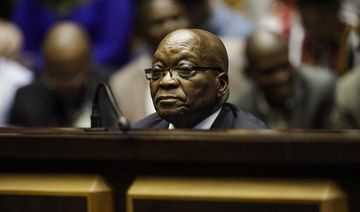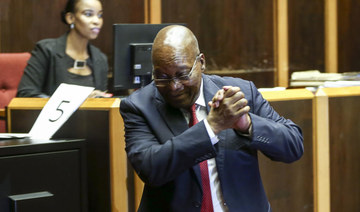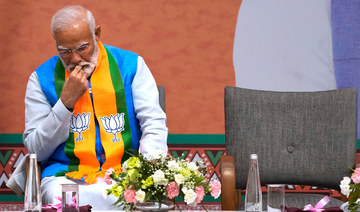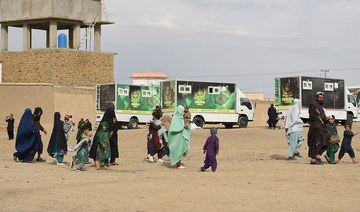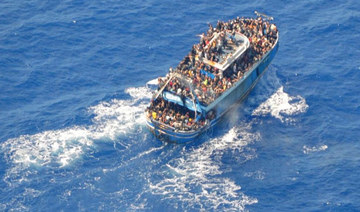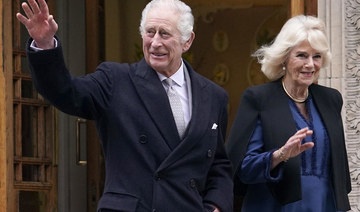JOHANNESBURG: South Africa's ex-president Jacob Zuma lashed out on Sunday at the judges who this week gave him a 15-month jail term for absconding from a corruption inquiry, comparing them to the white minority apartheid rulers he once fought.
Zuma spoke at his home in Nklandla, in a rural part of Kwazulu Natal province, where hundreds of his supporters, some of them armed, were gathered to prevent his arrest.
"The fact that I was lambasted with a punitive jail sentence without trial should engender shock in all those who believe in freedom and the rule of law," Zuma told journalists.
"South Africa is fast sliding back to apartheid rule."
The constitutional court sentenced Zuma on Tuesday for contempt of court for failing to appear at a hearing in February of the inquiry led by Deputy Chief Justice Raymond Zondo.
On Saturday it agreed to hear his challenge to the jail term, suspending it until after a hearing on July 12.
The sentence was seen as a sign of just how far Zuma, once revered as a veteran of the struggle against white minority rule, has fallen since embarking on a presidency beset by multiple sleaze and graft scandals between 2009 and 2018.
Earlier on Sunday, gunshots rang out across Nklandla, as some of his supporters fired their weapons into the air, while others danced with spears and ox-hide shields -- the traditional weapons of Zuma's Zulu nation.
"I fought and went to prison so there must be justice and the rule of law. No honest person can accuse me of being against the rule of law," Zuma told journalists.
Defiant ex-leader Jacob Zuma compares South African judges to apartheid state
https://arab.news/gzskp
Defiant ex-leader Jacob Zuma compares South African judges to apartheid state
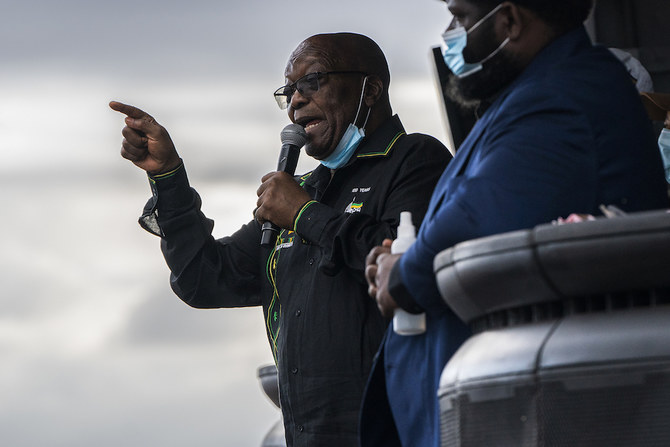
- The constitutional court sentenced Zuma on Tuesday for contempt of court for failing to appear at a hearing in February
Out on bail, firebrand Indian politician poses fresh challenge for Modi

- Kejriwal’s Aam Aadmi Party is in power in the Delhi region and in the northern state of Punjab, which together account for just 20 seats in parliament, out of the 543 being contested
NEW DELHI: Firebrand Indian politician Arvind Kejriwal has hit the ground running since his surprise release from detention in the midst of a contentious general election, energizing the opposition as it challenges Prime Minister Narendra Modi.
The Supreme Court gave 55-year-old Kejriwal, who is also the chief minister of the national capital territory of Delhi, bail in a graft case on May 10 and he wasted no time in getting on the campaign trail.
“I have only one request from you; we all have to come together to save the country from dictatorship. I am fighting this dictatorship with all my might,” he told a jubilant crowd soon after walking out of Delhi’s Tihar jail, clearly referring to Modi.
HIGHLIGHTS
• Delhi voters have mixed reactions to his campaign.
• Kejriwal will generate sympathy but victory unsure, analysts say.
Kejriwal is part of the INDIA alliance led by the Congress Party and one of its biggest crowd-pullers. Analysts say while his campaigning will give fresh impetus to the opposition, they are unsure if that will translate into any significant victories against the ruling Bharatiya Janata Party, which is tipped to return to power.
Kejriwal’s Aam Aadmi Party is in power in the Delhi region and in the northern state of Punjab, which together account for just 20 seats in parliament, out of the 543 being contested.
“He may be able to generate some sympathy vote, but would that be enough to change the outcome of the election?” said Rahul Verma, a fellow at the New Delhi-based Center for Policy Research think tank.
“The BJP led in Delhi by 20 percentage points on an average in each seat, so it needs a substantial amount of swing for BJP to start losing seats in Delhi,” Verma added.
Still, Kejriwal has the ability to embarrass the BJP.
A day after his release, he said Modi, central to the ruling party’s campaign, would not be prime minister beyond 2025 when he turns 75, and would hand over the reins to Home (Interior) Minister Amit Shah.
“Modi made the rule in BJP that whoever turns 75 will be retired. So I ask BJP, who will be your prime minister?” Kejriwal said. “Modi is not seeking for votes for himself, but for Amit Shah...who will fulfil Modi’s guarantees then?“
The BJP scrambled to deny the suggestion that flag-bearer Modi would retire.
ANTI-GRAFT CRUSADER
India began voting on April 19 in the seven-phase election in which Modi, 73, is seeking to be the second prime minister to win a third straight term since independence leader Jawaharlal Nehru.
Delhi goes to the polls on May 25 and Punjab on June 1. Results are due on June 4.
Kejriwal is an anti-corruption crusader-turned-politician with a reputation of being a street-fighter. He projects himself as a messiah of the working class through AAP’s focus on health care, schools and subsidies, and has a high profile image in the media, allowing him to punch above his weight, analysts say.
The Enforcement Directorate, India’s financial crime-fighting agency, arrested him on March 21 in connection with corruption allegations related to the capital territory’s liquor policy.
Kejriwal has dismissed the graft allegations against him as an attempt by Modi’s government to destroy his party and damage the opposition. Modi and the BJP have denied the charges.
Delhi’s voters had mixed reactions to his campaign.
“Giving bail to Kejriwal is like adding fuel to the fire (for the opposition),” said Irshad, 35, a barber in Delhi’s Jahangirpuri area, who gave only his first name. “He’s a genuine leader.”
In the Model Town locality of the capital, vegetable vendor Surya Bali, 33, asked: “If he was not corrupt, why would they send him to jail?“
Some were undecided who they would vote for, including Madhuri Akshay Rajput, 30, a tailor in another part of the city. “Whether Kejriwal has done something wrong or not, going to jail dents your image,” she said. “What’s the point of voting? Nothing has changed.”
4 killed, including 3 foreign tourists, in Afghanistan shooting: govt

- According to preliminary information provided by hospital sources, the three foreigners who were killed were Spanish nationals
- The wounded were from Norway, Australia, Lithuania and Spain
KABUL: Three foreign tourists and an Afghan were killed on Friday in a shooting in the popular tourism destination of Bamiyan in central Afghanistan, the interior ministry said.
“One Afghan and three foreign nationals were killed,” in gunfire Friday evening in Bamiyan city, interior ministry spokesman Abdul Mateen Qani, told AFP.
Another four foreigners and three Afghans were wounded, he added.
Qani said the “foreigners were here for tourism,” without giving the nationalities of the foreign victims.
According to preliminary information provided by hospital sources, the three foreigners who were killed were Spanish nationals.
The wounded were from Norway, Australia, Lithuania and Spain.
Diplomatic sources said they were seeking to confirm the information, including the identities of the dead.
Security forces have arrested four people in connection with the attack, Qani said.
He did not say if there had been multiple shooters.
The Taliban government “strongly condemns this crime, expresses its deep feelings to the families of the victims and assures that all the criminals will be found and punished,” Qani said in a statement.
A local resident, who did not want to be named, said he “heard the sounds of successive gunshots, and the city streets leading to the site were blocked immediately by the security forces.”
Bamiyan, home to the giant Buddhas blown up by the Taliban in 2001, is Afghanistan’s top tourist destination.
Deadly attacks on foreigners have been rare in Afghanistan since the Taliban returned to power in August 2021.
Tourists have been traveling to the country in increasing numbers in recent years as security has improved since the Taliban ended their insurgency after ousting the US-backed government.
Arriving in western Herat province Friday evening, a foreign tourist posted on a WhatsApp group for travelers in Afghanistan that he and others were stopped by the Taliban authorities and told “that because of Bamiyan we were no longer safe.”
“After some time and Google translate, we convinced them to let us go, they said go eat quickly and get off the streets,” the tourist said.
The Bamiyan region is majority inhabited by members of the Hazara Shiite community.
The historically persecuted religious minority has been repeatedly targeted by the Daesh group, which considers them heretics.
The number of bombings and suicide attacks in Afghanistan has reduced dramatically since the Taliban authorities took power.
However, a number of armed groups, including IS, remain a threat.
Greek trial of Egyptians over Pylos shipwreck may be unfair: Rights groups
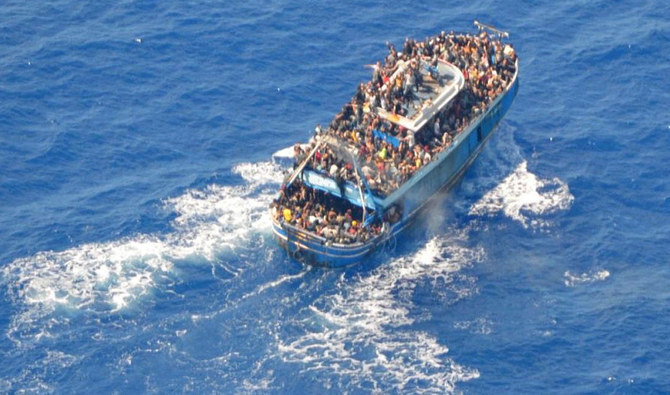
- Amnesty International, Human Rights Watch: Defendants disadvantaged by Coast Guard investigation, withheld evidence
- Groups say evidence altered by Coast Guard, which was accused by survivors of causing disaster that killed over 600 people
LONDON: Human rights groups have raised concerns that the upcoming trial in Greece of nine Egyptians who survived the Pylos shipwreck in 2023 may not be fair.
The nine are charged with “smuggling, aggravated by the deaths of passengers, causing a shipwreck, irregular entry, and forming and membership of a criminal organization,” with the possibility of multiple life sentences if convicted.
However, while the trial is set to commence on May 21, an investigation into the culpability of Greek authorities over the disaster, which killed at least 600 of the 750 passengers aboard, is only at its preliminary stage.
Amnesty International and Human Rights Watch warned the mismatched timing of the process jeopardized the chance of a fair trial.
Judith Sunderland, associate Europe and Central Asia director at HRW, said: “There’s a real risk that these nine survivors could be found ‘guilty’ on the basis of incomplete and questionable evidence given that the official investigation into the role of the Coast Guard has not yet been completed.”
She added: “Credible and meaningful accountability for one of the worst shipwrecks in the Mediterranean needs to include a determination of any liabilities of Greek authorities.”
The overcrowded vessel sank in Greek waters on June 14 last year, carrying people mainly from Egypt, Syria and Pakistan.
Both HRW and Amnesty subsequently accused the Hellenic Coast Guard of culpability, and there have been numerous allegations that a patrol boat caused the disaster after it tried to tow the stricken migrant vessel.
So far, 53 survivors have come forward as part of a case brought against the Hellenic Coast Guard in front of the country’s Naval Court, which began in June last year but has made little progress.
However, the “Pylos 9” have been accused of being smugglers in charge of the vessel that sank and therefore culpable for the disaster.
They were arrested on June 15 following testimony by nine other survivors of the disaster blaming them, which was compiled and submitted by Coast Guard investigators. They deny the charges.
In a statement, HRW and Amnesty said: “There are real concerns regarding the respect of fair trial standards based on questions about the integrity of the investigation and evidence.
“The speed at which the investigation against survivors was concluded, and the Pylos 9 defense lawyers’ lack of access to the Naval Court case file compound these concerns.”
Investigations by Lighthouse Reports and Solomon also found eyewitness testimony compiled by the Coast Guard contained identical accounts of the accident, which omitted details about the patrol boat later submitted to a public prosecutor in Kalamata.
Another witness told HRW and Amnesty their testimony had been altered by the Coast Guard to omit the claim that the patrol boat caused the disaster.
The defense team for the nine Egyptians has also claimed requests for evidence for the criminal trial, including data from survivors’ mobile phones confiscated by Greek authorities, have been denied over questions into the jurisdiction of the Naval Court investigation.
“The defendants’ lawyers have been unable to gain access to the investigation file before the Naval Court despite its clear relevance to preparing the defense,” Amnesty and HRW said.
“The judge also rejected motions by defense lawyers to take testimony from additional survivors, and to acquire the communications between the Hellenic Coast Guard, Frontex and the Greek Joint Rescue Coordination Center, and aerial photos of the boat prior to the shipwreck.
“The Kalamata court should guarantee that the Pylos 9 receive a fair and impartial trial, and that their full due process rights are upheld and respected. The Naval Court should advance investigations promptly, effectively and impartially and ensure the safe and effective participation of the largest possible number of survivors and relatives of victims and full collection of evidence,” they added.
The groups also highlighted the tendency for Greek authorities to blame people from ethnic minorities for smuggling and people trafficking, citing a study that said that as of February 2023, 90 percent of the 2,154 people detained in Greece on smuggling charges were “third country” nationals.
“Time and again, in Greece and in other countries, racialized people who are seeking to travel to Europe end up being the only ones facing accountability in the context of migration movements,” said Adriana Tidona, migration researcher at Amnesty International.
“The Pylos investigations and trials must serve as a turning point for this dangerous trajectory.”
King Charles III to attend D-Day anniversary in France: palace

- The 75-year-old British head of state will be at a commemorative event at the British Normandy Memorial in northern France on June 6
- Charles will be accompanied by his wife Queen Camilla and elder son Prince William
LONDON: King Charles III is to make his first overseas trip since being diagnosed with cancer, at an event to mark the 80th anniversary of the D-Day landings, Buckingham Palace said on Friday.
The 75-year-old British head of state, who only recently resumed public engagements, will be at a commemorative event at the British Normandy Memorial in northern France on June 6, a statement read.
The memorial, at Ver-sur-Mer, is near Gold Beach, the codename for one of five separate beachheads in northern France where Allied troops came ashore on June 6, 1944.
Charles will be accompanied by his wife Queen Camilla, 76, and elder son Prince William, 41, who will join Canadian veterans at the Juno Beach Center at Courseulles-sur-Mer, along the Channel coast.
William will then join more than 25 heads of state, representing his father at the international commemorative ceremony at Omaha Beach, where US troops landed.
Charles and Camilla will head to France, where they made a three-day state visit last year, after attending the UK’s national commemorative event in Portsmouth, southern England, on June 5.
Senior royals will be out in force in both the UK and France for the anniversary, which is likely to be among the last to feature veterans who served in World War II.
As head of state, Charles is commander-in-chief of the British armed forces but also served in the Royal Navy and Royal Air Force.
His heir William was an RAF search and rescue pilot before becoming a full-time royal.
One notable absentee from the commemorations will be William’s wife Catherine, 42, who is receiving chemotherapy treatment for cancer, and was last seen at a public engagement in December last year.
Charles announced his diagnosis in February but last month royal officials said doctors were “very encouraged” by the progress of his treatment, allowing him to resume his official duties.
This week he has attended a Buckingham Palace garden party and a commemoration service at St. Paul’s Cathedral, as well as unveiling a new official portrait of himself.
Elon Musk confirms Twitter has become X.com

- Billionaire head of Tesla bought Twitter for $44 billion in late 2022 and announced rebrand to X last July
- Although the logo and branding were changed to “X,” the domain name remained Twitter.com until Friday
PARIS: The social network formerly known as Twitter has fully migrated over to X.com, owner Elon Musk said on Friday.
The billionaire head of Tesla, SpaceX and other companies bought Twitter for $44 billion in late 2022 and announced the rebrand to X last July.
Although the logo and branding were changed to “X,” the domain name remained Twitter.com until Friday.
“All core systems are now on X.com,” Musk wrote on X, posting an image of a logo of a white X on a blue circle.
Queries to Twitter.com redirected users to X.com on Friday morning, though the original domain name still appeared on some browsers.
Musk has repeatedly used the letter X in the branding of his companies, starting in 1999 with his attempt to set up an online financial superstore called X.com.
When he bought Twitter, he set up a company called X Corp. to close the deal.
Musk has said he wants “X” to become a super-app along the lines of China’s WeChat.
The Chinese app is much bigger than X and weaves together messaging, voice and video calling, social media, mobile payment, games, news, online booking and other services.
He has also bolted onto X an AI chatbot called “Grok,” which was launched in Europe this week.
Musk’s leadership of X has proved controversial.
He has fired thousands of staff, overseen major technical problems and reinstated accounts of right-wing conspiracy theorists, as well as former US president Donald Trump.
European regulators have also begun probes into X and other social media platforms over fears of misinformation.
The EU demanded earlier this month that X explain its decision to cut content moderation staff, giving the firm a deadline of Friday.
AFP has contacted X for their response.



